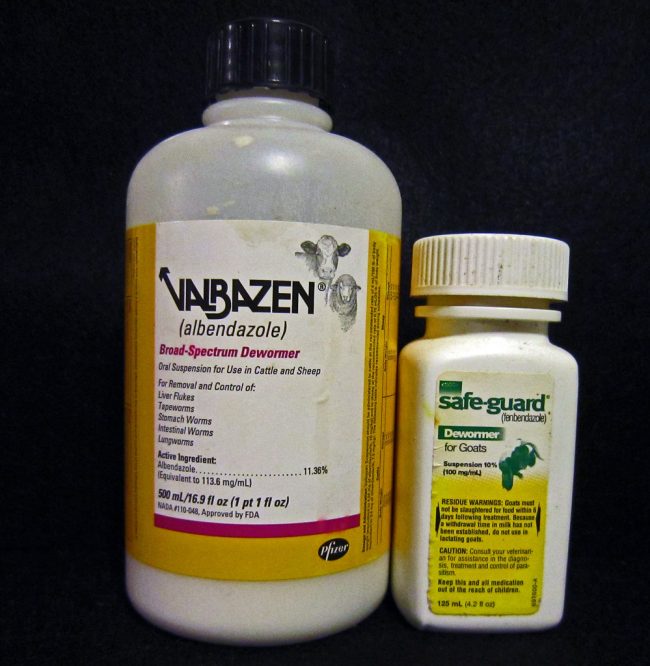Fenben powder is used to treat cattle, sheep, goat and pigs infestation with gastrointestinal nematodes and lung worms. It is safe to use and has a track record of over 50 years.
It acts by inhibiting the polymerization of tubulin, which is the primary constituent of microtubules, the structures that form cytoskeletons and provide shape to cells. This results in cell death similar to that induced by cytotoxic anticancer drugs.
Fenbendazole / Omeprazole / Aluminum Hydroxide / Magnesium Hydroxide
Fenbendazole is a broad spectrum methylcarbamate benzimidazole anthelmintic that is used in the treatment of many different parasitic conditions. In dogs, it is used to treat hookworms (Ancylostoma caninum, Uncinaria stenocephala), whipworms (Trichuris vulpis), and tapeworms (Taenia pisiformis). It also is effective against roundworms in cattle, sheep, goats, and pigs, as well as in cats and dogs. It is a moderate-acting medication, meaning that it takes a few days to begin working.
The antiparasitic activity of fenbendazole is based on its binding to tubulin and disrupting microtubule equilibrium in the parasites. Upon absorption in the gut, only small amounts of the drug and its active metabolites reach tissue levels. However, this low level of absorbed fenbendazole is sufficient to kill the parasites.
Compared with other common medications for the control of parasites, fenbendazole has been shown to be particularly effective against a variety of internal parasites in dogs, cats, ferrets, chickens, ducks, horses, pigs, and other species. It is especially useful against parasites such as the protozoa Giardia lamblia and nematode Roundworms, Tapeworms, and Pinworms.
In addition, fenbendazole has demonstrated efficacy against some parasites that are resistant to other medications such as ivermectin. Ivermectin has also been shown to be ineffective against some helminthes such as filarial worm infections.
When a pet is diagnosed with a parasite infestation, veterinarians typically prescribe a deworming regimen using a combination of medications to provide the most complete treatment for the specific issue. Often, a fecal exam will be done to verify that all internal parasites have been killed and that the deworming schedule should be adjusted accordingly. Some pets will require regular bloodwork or other monitoring to ensure that the medication is not affecting them in a negative way. This type of monitoring is often needed if the pet has been on a long-term medication to prevent overdosing or adverse side effects. Other animals may only need to be monitored on an as-needed basis, depending on their specific needs and the medications they are on.
Fenbendazole / Omeprazole / Fenbendazole / Fenbendazole / Fenbendazole / Fenbendazole / Fenbendazole / Fenbendazole / Fenbendazole / Fenbendazole / Fenbendazole / Fenbendazole / Fenbendazole / Fenbendazole / Fenbendazole / Fenbendazole / Fenbendazole / Fenbendazole / Fenbendazole / Fenbendazole / Fenbendazole / Fenbendazole / Fenbendazole / Fenbendazole / Fenbendazole / Fenbendazole / Fenbendazole / Fenbendazole / Fenbendazole / Fenbendazole / Fenbendazole / Fenbendazole / Fenbendazole / Fenbendazole / Fenbendazole / Fenbendazole / Fenbendazole / Fenbendazole / Fenbendazole / Fenbendazole / Fenbendazole / Fenbendazole / Fenbendazole / Fenbendazole / Fenbendazole / Fenbendazole / Fenbendazole / Fenbendazole / Fenbendazole / Fenbendazole / Fenbendazole / Fenbendazole / Fenbendazole / Fenbendazole / Fenbendazole / Fenbendazole / Fenbendazole / Fenbendazole / Fenbendazole / Fenbendazole / Fenb
Fenbendazole is a widely used antiparasitic drug that targets intestinal parasites including roundworms, hookworms, whipworms, and giardia. It is also often used off-label to treat and prevent respiratory parasites such as lungworms in dogs. However, fenbendazole does not treat all types of parasites and is ineffective against tapeworms spread by fleas. Therefore, it is important to discuss deworming schedules with your veterinarian.
In this article, we present a case of a patient with nonsmall cell lung cancer who received information about the antitumor activity of fenbendazole on Twitter and Facebook and self-administered this medication. This resulted in severe liver injury in the patient. Although social media sites facilitate communication among individuals, they are not regulated and may spread inaccurate medical facts. In addition, it is easy for nonmedical individuals to disseminate this information. It is therefore essential for healthcare professionals to monitor this information and educate the public about the risks of consuming unproven drugs.
The radiation dose-response curve of EMT6 cells treated with or without fenbendazole under aerobic and hypoxic conditions was determined by a colony formation assay. In both aerobic and hypoxic conditions, fenbendazole did not significantly alter the radiation-sensitivity of these cells. The level of cleaved caspase-3 and cytochrome-C in these cells was also measured by Western blotting. Both caspase-3 and cytochrome-C were activated by fenbendazole, and the levels of PARP, a potential substrate for these enzymes, were decreased.
This study demonstrates that the antitumor activity of fenbendazole is independent of its effect on tumor hypoxic niches. Instead, fenbendazole appears to trigger necroptosis by inhibiting the synthesis of phosphatidylserine and lysophosphatidylserine, thereby releasing apoptotic factors into the surrounding cells. This activity may explain in part why fenbendazole is often used as a radiosensitizer for a variety of cancers. Further studies are needed to determine if this activity can be exploited for the treatment of other diseases. This research was supported by National Institutes of Health Grants R01-CA095024 and P30-CA052450.

